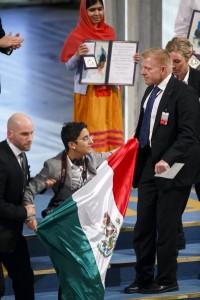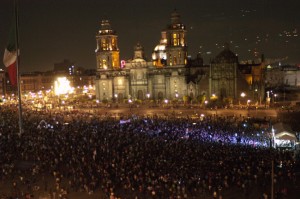In my humble (maybe not so much) opinion, Latin Americans feel a strong attachment to charismatic figures. Think for example, of Che Guevara. Che Guevara is drilled into our minds since an early age as a symbol of justice, leadership and true revolutionary Latin American spirit. In fact, even thinking about challenging the idea of what Che Guevara means to my Latin American identity makes me nervous!
However, much of what we say about Che Guevara has more to do with what he means to our identity than what he actually did. This is not to say that his work and ideas were not relevant. But the broader context is important. Frank Delgado, an irreverent Cuban singer who has been on the Cuban government’s bad side for a few years now, depicts the questions that someone like Che Guevara poses to newer generations. In his song “Con la Adarga al Brazo,” (“With the Shield by the Arm”) Delgado speaks about the social worship that follows the image of Che Guevara because of the impact that he had on the lives of people, not only in Cuba, but elsewhere. He sings,
“Guevara, you come back to the road with the shield by the arm.
You are painted in the youth’s t-shirts and you are guarding from the walls.
That’s why I take you in my wallet, as a good luck charm,
Like my landlord lady, who carries the image of a saint,
So you will protect me and will pull my ears if on a bad day I forget about Che.”
Nonetheless, years later, Delgado wrote a song titled “Si el Che Viviera” (“If Che was Alive”), where he asks, if Che was alive, would he live up to the image that we all have learned to love and cherish?
Delgado’s question has been on my mind when it comes to Malala Yousafzai’s activism and what her image means to me as a Muslim woman and a Mexican.
Muslimah Media Watch has extensively covered media portrayals of Malala’s work. Shireen recently wrote why she will not be wearing a Malala t-shirt and Nicolejhm described being torn by coverage of Malala. Similarly, Emaan described how Malala fits within a wider Western rhetoric about gender, Islam and the “other.” On my end, I have always had problems with Malala being depicted as the “missing link” between Islam and the West or as a unique woman in the East, as if no other women were doing any work for their communities.
But if there is something that we cannot deny, it is that Malala is slowly transitioning into what someone like Che is. In fact, Malala is not only becoming “a lucky charm” in issues related to education and gender, but she challenges the whole gendered aspect of being a symbol. If I try to think about women who are revered in Latin America the way Che Guevara is, I end up with maybe two names… but that’s it. So the question in my mind is, does Malala seem more of an “empowering” figure because of the stereotypes that she challenges rather than the actual work?
In the past few months, Malala has featured as an important figure in the grassroots organization being carried out in Mexico. For those who are not aware, Mexico is suffering from extremely high levels of state-led violence. For the past five months, people around the world have been organizing on the disappearance of 43 male students, who were teachers-in-training at the Ayotzinapa rural teacher’s college. The students were preparing to join a protest on October 2nd, when they were arrested by the state police and delivered to the mercenary group “Guerreros Unidos” with orders to be killed. The whole incident resulted not only in 43 disappearances but in the killing of other students. Five months later, we are still looking for them… This type of violence is not new in Mexico, but we had not seen it, as bluntly, since the 1970s. Of course this issue has raised questions about the number of disappearances, murders and feminicides since the start of the War on Drugs, which has undoubtedly resulted in numerous civilian “casualties.” What is more, the levels of state-led violence against students, activists, journalists, Indigenous peoples and women in the past 10 years speak to the complicity of the international community in not calling out human rights violations in Mexico.
Thus, people on the ground, doing the search, awareness and resistance works have reached out to “celebrities” like Malala. Malala in Mexico is somewhat of an education heroine, and unlike figures like Che Guevara who antagonized much of the West, she has their full attention and was even granted the Nobel Peace Prize! During the ceremony (maybe some of you noticed although it wasn’t greatly covered by the media) Adan Cortes, a Mexican student, interrupted the ceremony by jumping in front of Malala with a Mexican flag stained in red (representing blood). Cortes is reported to have said to Malala, “Please Malala.” The hashtag #PleaseMalala took a life of its own hours later, as Cortes was detained and later deported to Mexico. Malala took some time to react… and she is quoted as saying, “…so there are problems in Mexico. There are problems even in America, even here in Norway, and it is really important that children raise their voices.”
Upon reading the reports, I must admit I was puzzled. First, I think many of us expected a “stronger” reaction given that her own life was at stake for pursuing education. What is more, many of us were concerned for Adan Cortes, who was deported to Mexico, and whose life could be in danger… but all he got was a “good for you for raising your voice!” Earlier this week the Mexican media reported again that children in Mexico are soliciting a visit from Malala, the articles explain that about 18, 000 kids in the country wrote letters to Malala talking about the challenges of being a student in Mexico. Some of these challenges range from lack to access and discrimination (in the case of Indigenous kids), to the violence perpetrated by the state and the organized crime.
Nevertheless, I am less than optimistic. Other than access to education, which is part of Goal 2 in the Millennium Development Goals, we are not talking about the violence, the human rights violations, and the perpetual denial of Indigenous rights, among others. So, I now see Malala at the crossroads of what Frank Delgado talks about, is she the myth or is she the real thing? If so, will she live up to the expectations of an increasingly oppressed population that has placed in her hands the perhaps unreasonable expectation to challenge Western complicity?


